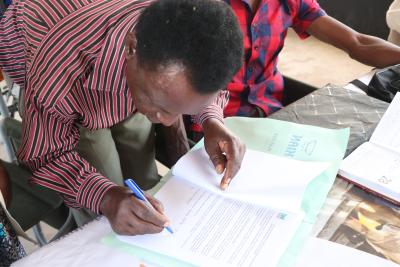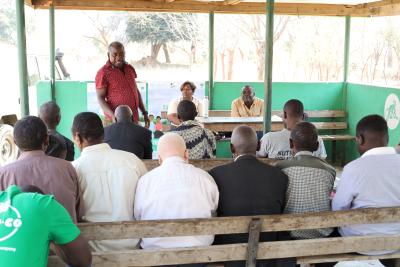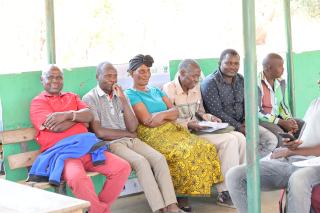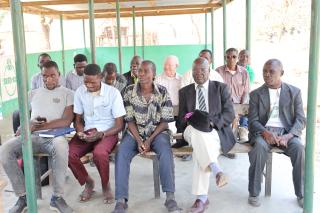- Home
- Worldwide
- Our regional offices
- Southern Africa and Madagascar
- News : Southern Africa and Madagascar
- In Zambia - The SWM Programme and Zambia’s Nyawa community will work together for a sustainable future.
In Zambia | The Sustainable Wildlife Management SWM Programme and Zambia’s Nyawa community will work together for a sustainable future.

Chiefdom Prime Minister Ngambela, Nyawa community in the Kazungula District © W.Sichone, Cifor
The consent followed consultative meetings between the SWM Programme and the local communities and their leaders. The signing ceremony was, therefore, a significant milestone in the rollout of community conservation activities in the area and the acknowledgement of the SWM Programme(*) as a key wildlife conservation partner in the country.
The SWM Programme in Zambia is promoting the sustainable use of natural resources, including wildlife and fisheries, and this has been through community conservancies. It is also developing alternative sources of proteins, such as improved means of livestock production and aquaculture.
The Tonga speaking Nyawa community is the first ethnic to grant and append signatures to consent to working with the SWM Programme among communities in the Kavango–Zambezi Trans-frontier Conservation Area (KaZa TFCA) site.
All parties present were impressed by the SWM Programme’s FPIC process and appreciated the openness of the programme towards the local people. The signing ceremony was witnessed by officials from the Nyawa Community Development Trust (NCDT), the Nyawa Traditional Council, the Community Resource Board as well as ward councillors.
We thank his royal highness, Chief Nyawa`s representative, Ngambela Gideon Siapenga, for representing the chief at all the major community interactions and overseeing the signing off on behalf of his royal highness. This shows the high regard and importance that the chiefdom holds the SWM Programme as a partner in its quest for natural resources based revenue generation and equitable benefits sharing to the chiefdom through wildlife and other resources conservation.
The Chief’s representative also showed gratitude to the SWM Programme for helping their community through various initiatives.
This event marks a new dawn in the chiefdom. We just unplugged development for all through spearheading a community wildlife conservation model that will be managed by and for the community with support from the SWM Programme.
The United Nations Declaration on the Rights of Indigenous Peoples recognizes the specific right to consent or reject a project known as FPIC as belonging to indigenous peoples and local communities (UNDRIP). This implies that indigenous peoples and local community residents are given the choice to or not to consent to any project that may have an impact on them, their territories or areas under their jurisdiction under FPIC. They also have the right to revoke their consent at any time after they have granted it. Indigenous peoples can then bargain the terms under which the project will be planned, carried out, monitored, and assessed through the FPIC process. The Tonga people are recognised by the United Nations as one of the indigenous people groups of the world.
Indigenous peoples and rural communities are at the core of the SWM Programme and their equitable participation and rights-based inclusion is crucial
(*)The SWM Programme is an initiative of the Organisation of African, Caribbean and Pacific States, funded by the European Union and co-financed by the French Facility for Global Environment and the French Development Agency. It is implemented by a consortium of partners which includes the Food and Agriculture Organization of the United Nations (FAO), the French Agricultural Research Centre for International Development (CIRAD), the Center for International Forestry Research (CIFOR), and the Wildlife Conservation Society (WCS). The KaZa Project is coordinated by CIRAD. In Zambia, CIRAD is implementing the project activities in partnership with CIFOR and in coordination with the government of Zambia.



























